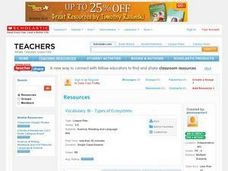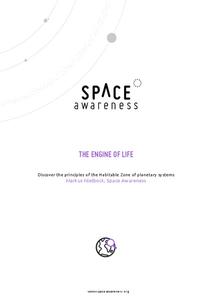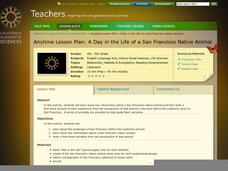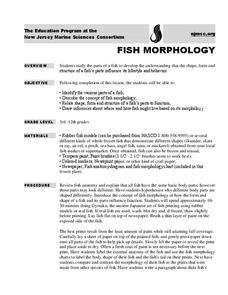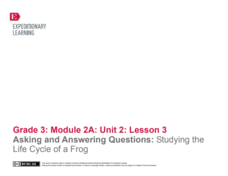Curated OER
Turning the Tide on Trash: Marine Debris Curriculum
Six different lessons comprise this unit on marine debris. Science, language arts, social studies, and art projects make this an ideal interdisciplinary unit. The result will be well-informed future citizens who can help make a...
Curated OER
Life Cycle of a Monarch Butterfly
Students identify the stage of the butterfly's life cycle. In this life cycles lesson plan, students create a KWL chart about monarch butterflies. Students observe monarch caterpillars in an aquarium and identify the various stages of...
Cheetah Outreach
Life Cycles
How does a cheetah life cycle differ from a human life cycle? Kids graph weight gain for humans versus cheetahs and compare other life cycle events such as gestation and life span
Baylor College
Fuel for Living Things
During a three-part lesson, learners make a cabbage juice pH indicator and use it to analyze the waste products of yeast after feeding them with sugar. The intent is to demonstrate how living organisms produce carbon dioxide, which is...
Institute of Electrical and Electronics Engineers
Life Vest Challenge
After reading about the history and science of personal floatation devices, patents, and intellectual property, engineering teams design a life vest for a can of soup. To evaluate which groups considered the need for waterproofing, hold...
NASA
Is It Alive?
Determining whether or not something is living can be more difficult than it seems. Put your young scientists to work defining their own criteria to identify life, then work with three samples to see if they are alive or not.
Curated OER
Vocabulary: Types of Ecosystems
Pupils practice using vocabulary words from life science. They will investigate the ecosystem and the terms that are associated with it. In addition, they will complete a fill-in-the-blank exam using the vocabulary words.
NOAA
A Day in the Life of an Ocean Explorer
What's life like aboard an ocean exploration vessel? Junior oceanographers examine the important role of communication in ocean research in lesson two of a five-part series from NOAA. The materials introduce the class to life on board...
Curated OER
Word Search: Common Marine Mammals
Young oceanographers find these common marine mammals in a word search. Each of the eighteen mammals has a bright, but accurate representation of each on the worksheet. Also, there is an answer key at the bottom. Well done!
Science Geek
Build a Food Web Activity
Entangle your life science class in learning with this collaborative food web activity. Using pictures of the plants and animals native to a particular ecosystem, young biologists work in small groups to construct visual representations...
University of Waikato
Build a Marine Food Web
Dive into a lesson on marine ecosystem interactions. Individuals learn about and devise a marine food web. The resource provides organism cards and pupils use article resources to discover interactions before modeling them in a food web.
Curated OER
Urban Life: What Lives In Our Local Park?
Fifth graders participate in activities during a visit to Central Park. In this urban life lesson, 5th graders visit Central Park where they explore pond dipping, stream chemistry, and play a native plant Bingo game.
Curated OER
I Wonder How the Manduca Life Cycle Compares To the Human Life Cycle...
Students study life cycles including developing their understanding of the human life cycle. They decide where they are in the human life cycle and provide reasons for that placement. They compare the human life cycle to that of the...
Curated OER
Mealworms
Crawl into the world of the darkling beetle with this scientific investigation. Watch as the insects move through the larval, pupal, and adult stages of life, recording observations along the way. Discuss the necessities of life as young...
NOAA
An Ocean of Energy
Young biologists trace the path of the sun's energy through marine ecosystems in the second part of this four-lesson series. Building on prior knowledge about producers, consumers, and decomposers students are introduced to the concept...
NOAA
Understanding Food Chains and Food Webs
Jump into an exploration of marine ecosystems with the first lesson in this four-part series. After first learning about crustaceans, mollusks, and other forms of sea life, young marine biologists view a PowerPoint presentation that...
American Farm Bureau Foundation for Agriculture
My Miniature Greenhouse!
Here is an activity that will peak your super scientists' interest and knowledge of greenhouse gardening. Green thumbs flourish when they build, prepare, take care of, and observe their seedlings inside a miniature greenhouse. With...
Curated OER
Science Giants
Fifth graders research about the work and accomplishments of their chosen scientist. In this life science lesson plan, 5th graders explore how to become one. They prepare a presentation and share it with the class.
Curated OER
Marine Debris
Now is the time to educate tomorrow's citizens to care for the planet, and here is a lesson to help facilitate the process. Collect some marine debris and bring it into class. Have your class separate it into types and then test each...
Space Awareness
The Engine of Life
There is a specific zone, or distance from a star, that a planet must be in order to have water in a liquid form. The activity demonstrates how flux density depends on its distance from the source. A photovoltaic cell gets power to drive...
California Academy of Science
A Day inthe Life of a San Francisco Native Animal
Although the lesson is specifically about the San Francisco Bay area, it's good enough to be adapted to any local region. Children research what the landscape in San Francisco was like prior to settlement, they consider the types of...
Curated OER
Sustainable Marine Fisheries
Through a fishing simulation, environmentalists discover consequences of over fishing. Afterward, they discuss how the activity relates to the impact of real-life commercial fishing. They also consider sustainability in the fishing...
Consortium for Ocean Science Exploration and Engagement (COSEE)
Fish Morphology
Life comes in all different shapes and sizes, and fish are no exception. Here, young scientists create fish prints as they learn how specific characteristics allow different species to survive in their particular habitats.
EngageNY
Asking and Answering Questions: Studying the Life Cycle of a Frog
A instructional activity challenges learners to ask and answer questions about the life cycle of a frog. With a class read-aloud, partner discussion, and notebook reflections, scholars complete a three-page worksheet to prove their...
Other popular searches
- 4th Grade Life Science
- Life Science Inquiry
- Life Science Vertebrates
- Life Science Experiments
- K 2 Life Science
- Life Science on Cells
- Life Science Lesson Plans
- Grade 4 Life Science
- Life Science Report Topic
- Australia Life Science
- The Life Science
- Life Science Lessons








